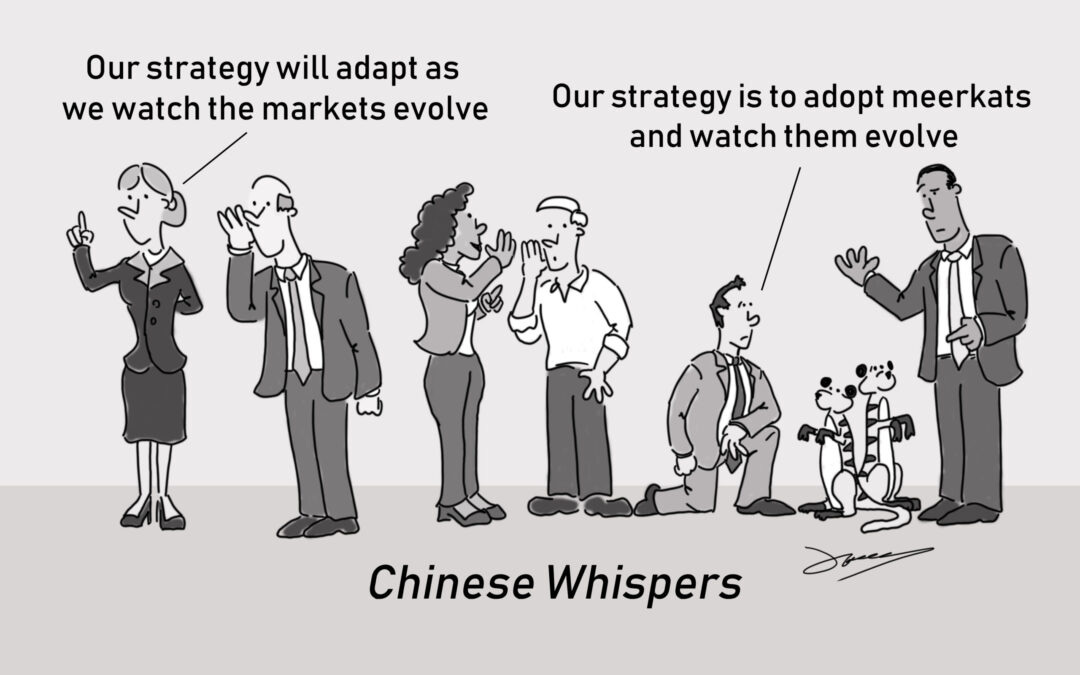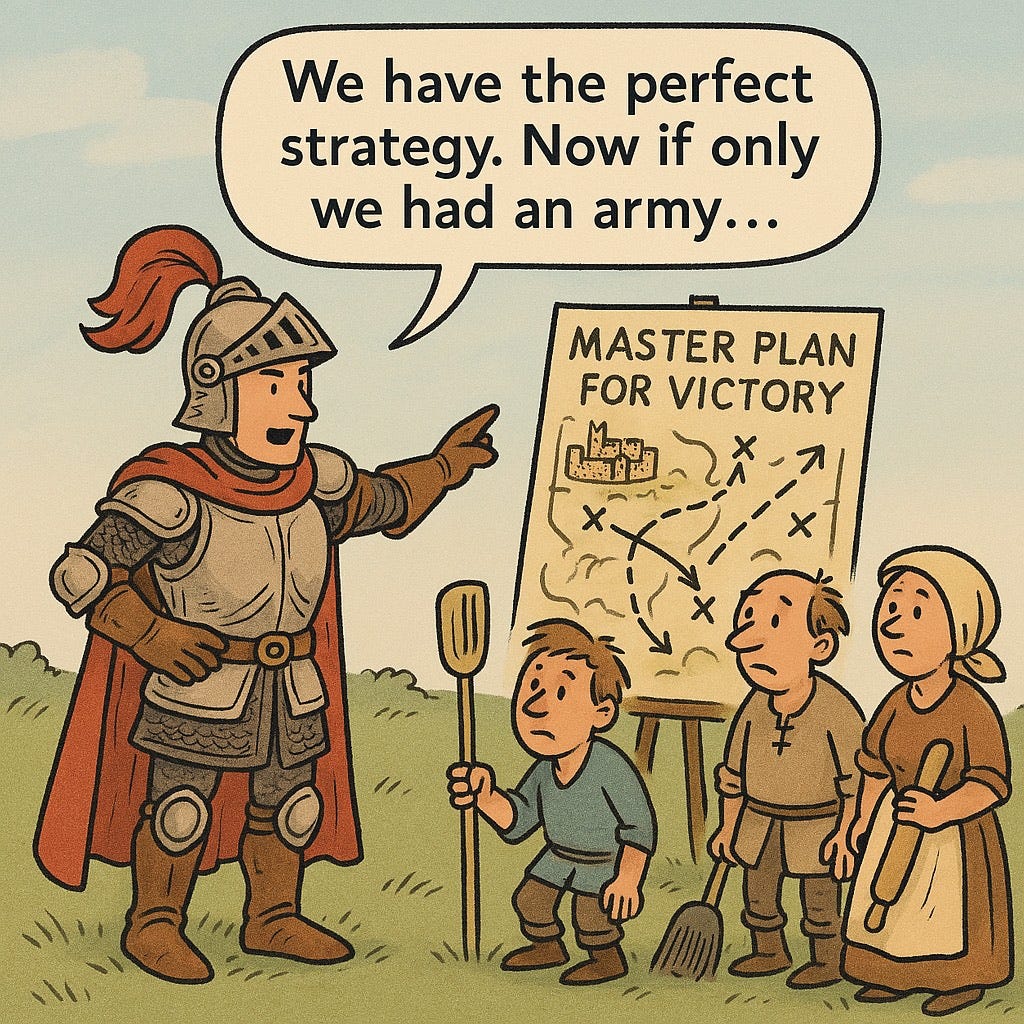What is a Good Strategy? If I had a dollar for everytime I was asked this question, boy, Elon Musk, you better watch out!
I often hit pause and reflect every single time as I “try” and answer this question because even though this question is actually the most basic, it is the most basic which is hard to define - such as why do we smile, why do we exist, what was before the big bang etc.
I asked people around on Substack as to what do they think is a “good strategy” and I got the following answers:
Set of actions that allows you to exponentially increase what you can achieve
Clarity. Consistency. Courage to say no
The kind that knows not to negotiate on the vision, but lets room for adaptability and opportunities along the way
Good strategy, IMHO, is just a clear, no BS plan for solving a tough problem
It’s the simplest path to meaningful progress
Good strategy needs to be undeniably clear but the plan to get there remains adaptable
I was pleasantly surprised by these responses. Some of the thoughts expressed here resonate with me completely, while some others make me reflect and question my own definition of a good strategy. While here I present my current understanding of a good strategy, I am sure if I come back to it in 10 years time, I would be like what the hell did you write here, you were completely off!. Here goes nothing.
A Good Strategy
A simple plan led by choice and differentiation, resourced and executed effectively, driving superior customer value creation, increasing the probability of sustainable future success.
Note to self, I need to simplify this statement further in the future, for now, let us go with this (hopefully one day I will lose more jargons from it). I will now try to break this down and give my reasoning for sections of this statement.
A simple plan
Strategy has to be simple. The purpose of a strategy is to be executed and execution requires percolation throughout the organization. I am assuming you have played Chinese whispers (or telephone) as a kid, passing on a message from one person to the other and eventually seeing the message being completely changed by the time it reaches the last person. Corporate ladder plays this Chinese whispers game all the time. If you want your message to reach the last rung of the ladder where it will be actually executed, keep it simple.
led by choice and differentiation,
This is where it starts getting interesting. One of the core elements of a good strategy is “choice”. There are many things that a business or even an individual can do to succeed but they are limited by resources (money, time, people). By choosing to focus on a few things, you increase your chances of execution and thereby success. Richard Rumelt, here uses the example of focussing a beam of sun’s energy on a paper via a lens that lead to it beng lit on fire whereas diffused sun beams can shine all over the surface producing no result at all. Focus by the way can be boring at times as you will have to say no to a lot of exciting prospects that fly by but trust me it pays.
The other key element here is differentiation. Here goes another one of Porter’s quotes (I had it in the last newsletter as well) - “If all you're trying to do is essentially the same thing as your rivals, then it's unlikely that you'll be very successful.”
You need to be different. If you are the same as your competition, then it becomes a price game and then you need to be a cost leader (which is again being different). So either be a true differentiator and create value or be a cost leader and create value still. But you cannot be a me-too product and expect great results. You can still make money but you will always be replaceable and that too quite easily.
resourced and executed effectively,
Now we move to execution. One of the first elements of execution is being resourced. I say this often, if your strategy is not resourced then it is a wishlist (“Castles in the air”). A great strategy just on paper or powerpoint presentation without proper resource allocation is a bad strategy or actually it is not even a strategy. The idea of strategy is realization and execution and that begins with ensuring you have the right capabilities and resources in place (or a plan to put them in place).
Next we move on to executed effectively. Now we know for a fact that most strategies fail in execution. Obviously one of the factors here is resourcing (which we just discussed), another big one is communication (simplicity helps there a lot!) but a big one is rigorous execution tracking. Strategy execution needs to be tracked more proactively. I see a lot of leaders do it once per quarter - not good enough. I believe it should be at least once per month. This also allows for learning and pivoting faster if the actions are not producing desired results rather than waiting for like 3 to 6 months.
driving superior customer value creation,
The fundamental aim of any strategy should be superior customer value creation. At the core of all choices and differentiation lies creating superior customer value vs yourself in the past and your competition in the future. I still feel that I have force fitted it here but I did not want to put up a definition of good strategy without customer value creation in there. A lot of times corporate houses end up making fancy strategies in headquarters without talking to one real customer. They have all the fancy analysis, customer trends, market projections but what they don't have is the real feel of a customer. A strategy made in the vacuum of understanding and driving customer value creation will crash even before it takes off. In future I might incorporate this more holistically in the definition but for now this will do.
increasing the probability of sustainable future success.
Last but not the least are results. A good drawn out strategy increases the probability of sustainable future success. Now I want to clarify a few points. Any good strategy has risk and usually this risk is substantial as you are betting on a future scenario. What a good strategy does is that it increases your probability of future success (as doing nothing or the same as now will for sure lead to failure) but that’s about it, it cannot guarantee future success. A good strategy can lead to abject failure but the strategy itself should not be defined by results but more by the process at which it is arrived at and executed. Hindsight is a convenient tool used by many strategists to describe strategic successes which could have been pure luck, as great strategies.
What this also means is that bad strategy can also lead to exponential success. That is true but the probability is much lower vs a good strategy.
The other element I write here is sustainable future success. The idea behind that is that strategy will bring success in the future (not present) and it should be sustainable. The differentiation you create should not be so easy to emulate that the results are short lived or never arrive. As I said a couple of days back, if you want to build for today you should have already built yesterday. Blockbuster kept building for today while Netflix came and built for tomorrow and disrupted the entire industry.
I have left out a few elements here which are often used along with strategy for specific reasons. I list them down below.
Risk: risk is inherent to all strategy and I alluded to it via probability.
Agility: while being agile is fundamental for any business I have kept away from including it here as it is often abused for not having a thought through strategy. Agile by itself is not a strategy.
Communication: This is critical for the success of any good strategy. I allude to this a bit via simplicity and effective execution. I am torn between keeping it in and taking it out.
Well to recap a good strategy is - A simple plan led by choice and differentiation, resourced and executed effectively, driving superior customer value creation, increasing the probability of sustainable future success.
I have drawn inspiration from Michael Porter, Roger Martin and Richard Rummelt for this definition. In the future I am sure this will evolve as my understanding of this simple yet complicated topic evolves.
Hope you had fun reading this. Feel free to share. See you next week.








Thanks for this post - I enjoyed reading it!
It inspired me to write my personal answer to the question here:
https://strategynugget.substack.com/p/what-is-a-great-strategy
Great content and some really sound advice in this post! Very enjoyable to read.